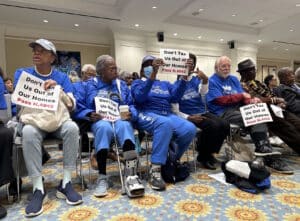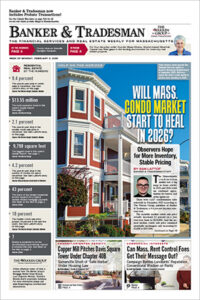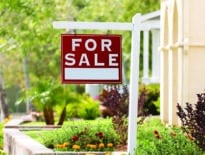
Boston homeowners with Mass. Senior Action listen to speakers at a State House rally during the Senate to pass Boston Mayor Michelle Wu's tax bill on Sept. 25, 2024. Photo by Sam Doran | State House News Service
A wave of around 50 elderly Boston homeowners swept through Senate offices Wednesday asking lawmakers to advance Mayor Michelle Wu’s property tax plan, while a Boston councilor took the floor at City Hall a couple hours later to oppose Wu’s tax shift and propose his own relief plan.
The homeowners, members of the Mass. Senior Action Council, expressed frustration with both the Senate and the cost of living during a program in a State House function room.
Adonica Chaplain, a 43-year resident of Hyde Park, called for senators to “get off the pot.”
“There’s no way, there’s no way, that somebody who bought a house 44 years ago has to pay what we already pay. Our salaries were lower then, and they’re getting lower now,” Chaplain said, calling for senators to pass Wu’s plan (H.4942).
Wu first proposed her plan in April and said it was necessary to avoid a potential 33 percent hike in residential tax bills. The bill would temporarily shift a greater tax burden onto commercial property owners to soften an expected hike to residential rates thanks to rising residential values and falling office property values.
The House approved the mayor’s bill on penultimate day of formal sessions in July.
Told of a potential 33 percent increase ballooning their tax bills without intervention, there were sounds of disapproval and one senior in the audience muttered, “That’s not fair.”
Carolyn Villers, executive director of Mass. Senior Action, told them that under Wu’s plan, commercial taxpayers in the city would still see a 2 percent drop in their bills, while a lesser impact on residential taxpayers would ring in at “close to” 10 percent.
To avoid a major spike in residential bills in January, Villers said the Legislature would need to approve the home-rule bill by Nov. 15 – a little over seven weeks away.
“Unfortunately, we don’t know what we’re going to do,” said Jean Jordan of Mattapan. “Some of us are probably going to lose our houses. For me, I have Social Security and a pension, and that’s not enough to even pay the bills I have right now.”
In Chamber Appearance, Wu Doubles Down
The tax bill was the talk of the town Wednesday. Earlier in the morning, Wu was quizzed about her strategy for offsetting high property tax increases at a Greater Boston Chamber of Commerce forum at the Boston Renaissance Hotel.
During a question-answer period after Wu’s speech, Chamber CEO James Rooney said he and the mayor talk about the proposed tax shift “all the time.”
“The Chamber, other business groups have opposed the proposal given the struggles of commercial properties in our downtown and negative impacts on small businesses and tenants. No easy solutions to this situation. I know you appreciate that,” Rooney said. “Some have predicted that this is a 10-year challenge for any city to get out of. So walk us through your thought process on this being the answer in the moment. And you know the Legislature may or may not take it up before the end of the year. What’s the plan? What are the contingencies, if they don’t?”
The mayor doubled down on her policy proposal in reply, telling Rooney, “We are looking for this particular solution.”
“It’s certainly not the easiest one to get. And believe me, if I didn’t have to ask for this, I would be trying to pursue a different method, because getting through all these levels of approvals is tough,” she said with a laugh.
Wu told the Chamber she did not favor dipping into city reserves to offset tax hikes. Such a savings withdrawal would drain around half of the $500 million in unrestricted cash on hand, she said, $100 million of which she wants to invest in a new “Housing Acceleration Fund” to restart the city’s sluggish multifamily development sector.
“And so to do that when unemployment is low, when the economy and all the signs are moving in the right direction, is actually not a fiscally responsible choice for the city,” Wu said.
City Councilors Press for a ‘Plan B’
But at a City Council meeting later that day, Councilor Erin Murphy told her colleagues it was “important that we talk about what the administration’s plan B is.”
If the bill does not pass and the issue “ends up coming back to us,” she said councilors should prepare their own ideas and get ready to “answer to our business owners, but of course, our residents who are afraid of their upcoming increases to their property taxes.”
City Councilor Ed Flynn on Wednesday spoke in favor of an order seeking a hearing on $15 million in tax relief.
The South Boston resident said the aid would go toward lowering property taxes for “35,000 Boston residents most in need of relief, such as our seniors on fixed income and working families.”
Flynn said that “now is not the time for us to raise property taxes in Boston.” He added that “it is critical that we practice fiscal discipline in Boston.”
While Wu’s plan “was said to be aimed at protecting seniors and working families from dramatic increases and keep residents in their home,” Flynn said he had seen analysis that homes valued at more than $5 million would see savings of around $10,000, while homes valued below $1.5 million would only save around $400 from the plan.
He said his idea could “ensure that at least 20 to 30 percent of Boston households with an assessed home value of 1.5 million or lower would be financially protected with a property tax increase greater than 3.5 percent.”
The council referred the hearing order to its Ways and Means Committee.






